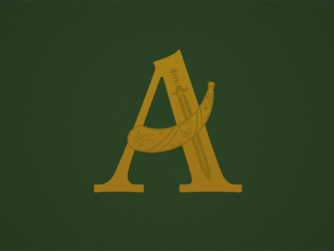Book I, Chapter 1 of The Lord of the Rings concludes with the aftermath of the birthday party. Bilbo has left behind gifts for friends and family ranging from the sincere to the brilliantly snarky, but no trace of gold or “jools”. As the Sackville-Bagginses come to terms with their meager inheritance, Frodo settles in as master of Bag End… and owner of a certain magic ring. We name unnamed dwarves, speculate wildly about the Dúnedain of the North (despite Tolkien’s best efforts), and remember another legendary hero with the initials F.B.: Ferris Bueller.
Recommended Reading:
Tolkien, J. R. R. The Hobbit (Mariner Books, paperback)
Tolkien, J. R. R. (Christopher Tolkien, ed.) The Silmarillion (Mariner Books, paperback)




My most recent reading of LotR was aloud to my son, and I noticed so many things I had not before. You guys touched on one of the most pointed of these in this episode: Only Bilbo and Sam ever willingly gave up the ring. This is, I think, incredibly significant. It demonstrates the quality that makes hobbits so different than the other peoples of Middle Earth. But I think you give Sam the short shrift by dismissing him as “not a ringbearer for any real length of time”. Let’s not forget WHERE he bore the ring.
Tolkien makes much of how the ring’s power and urge to return to its master gets ever more powerful the closer the hobbitses get to Sauron. It’s not simply the length of time that Frodo bears the ring which takes him past the point of being able to willingly give it up. He bore the ring reluctantly, and would have gladly given up the burden on three occasions, even after he had born it for more than 16 years and was well aware of what it was. But keep in mind, those three occasions were in well-protected locales (the Shire, Rivendell, and Lothlorien) and in the presence of some of the most powerful forces for good Middle Earth ever had seen (Gandalf, Elrond, and Galadriel). Bilbo had the ring much, much longer than Frodo, and he used it far more frequently. But he never bore it under the lidless eye’s oppressive searching in its home land. While the length of his burden made it somewhat difficult to give up, he was still able to do so.
Sam bore the ring – and wore it – in Mordor. He felt its burden more acutely than Bilbo ever did. While Bilbo certainly felt its strain on his soul more (getting … stretched), that was the cumulative result many years of use. The ring never tempted him with visions of power or privelege or the salvation of the world. He merely saw it as a convenience. Sam, on the other hand, felt the full strain of Sauron’s search. He felt the temptation to become Samwise the Strong, savior and gardener of the whole of Middle Earth. He was tempted with it as the only way to take care of the people for whom he cared most – which would have been just about the strongest temptation to which he could be subjected.
I think Sam exemplifies the quality that made hobbits so well suited in Gandalf’s eyes for this task. It’s not simply that hobbits are stubborn and resistant to outside pressures. It’s that they have a certain fundamental humility, whether cultural or innate, that makes them more accepting of their limitations and their place in the world. Bilbo shows this quality throughout the Hobbit. Frodo certainly shows signs of this humility and perspective, but I think the combination of being of a “higher” class and being “the chosen one” made him more susceptible to the corrupting effect of the ring than Sam ever would have been. Sam, on the other hand, embodies it fully, with only a few moments of grandeur beyond when he bears the ring. At the moment when it matters the most, Sam remembers: “The one small garden of a free gardener was all his need and due, not a garden swollen to a realm; his own hands to use, not the hands of others to command.”
You make a fair point about where Sam bore the Ring, Ben. The time may have been short, but the intensity of its effects was heightened so close to the place of its origin. We absolutely do not mean to give sort shrift to Master Samwise! His experience with the Ring is arguably the clearest, and certainly the most memorable, example of the temptation the Ring holds. We will be exploring Sam and his hobbit-ness as we get deeper into the story. Thank you for the reminder!
Thank you guys so much for reading my question on air. I accept and agree with your answer. I hadn’t thought about the Ring of Fire not having the same kind of influence as the others. A little background on my question though is that it first came to me when I was listening to Corey Olsen’s recording of his classroom discussion while he was giving his first Tolkien class back in 2010. I thought I should write him to see what he thought then never did and forgot about it til I got to your episode on that chapter of the Silmarillion. I’m still kind of interested in what Dr. Olsen would say about it. But anyway, thank you for reading it. It meant a lot.
It was our pleasure, Phil. Thank you for a great question that gave us a good opportunity to research and speculate!
The Tolkien sense of humor reminds me of P G Wodehouse. He wrote about quirky relatives and friends of the primary character with understated snarkyness, and the careful choice of each word.